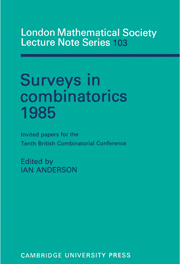Book contents
- Frontmatter
- Contents
- Preface
- Combinatorics and Ramanujan's “Lost” Notebook
- Irregularities of distribution and combinatorics
- Adaptive algorithms for communications
- Random flows: network flows and electrical flows through random media
- On greedy algorithms that succeed
- {0, 1*} distance problems in combinatorics
- Detachments of graphs and generalised Euler trails
- Graph minors – a survey
- Index
Graph minors – a survey
Published online by Cambridge University Press: 05 May 2013
- Frontmatter
- Contents
- Preface
- Combinatorics and Ramanujan's “Lost” Notebook
- Irregularities of distribution and combinatorics
- Adaptive algorithms for communications
- Random flows: network flows and electrical flows through random media
- On greedy algorithms that succeed
- {0, 1*} distance problems in combinatorics
- Detachments of graphs and generalised Euler trails
- Graph minors – a survey
- Index
Summary
Abstract. We survey a number of results about minors of graphs which we have recently obtained. They are basically of three types:
(i) results concerning the structure of the graphs with no minor isomorphic to a fixed graph
(ii) results concerning a conjecture of K. Wagner. that for any infinite set of graphs one of its members is isomorphic to a minor of another. and
(iii) algorithmic results concerning the DISJOINT CONNECTING PATHS problem.
INTRODUCTION
There are two fundamental questions which motivate the work we report on here.
(A) (K. Wagner's well-quasi-ordering conjecture). Is it true that for every infinite sequence G1, G2, … of graphs, there exist i, j with i < j such that Gi is isomorphic to a minor of Gj?
[Graphs in this paper are finite and may have loops or multiple edges. A graph H is a minor of a graph G if H can be obtained from a subgraph of G by contracting edges.]
(B) (The DISJOINT CONNECTING PATHS problem). If k ≥ 0, is there a polynomially-bounded algorithm to decide, given a graph G and vertices s1, …, sk, t1, …, tk of G, whether there are k mutually disjoint paths P1, …, Pk of G where Pi has ends si, ti (1 ≤ i ≤ k)?
[Two paths are disjoint if they have no common vertices.] Some of the background to these questions is discussed in sections 2 and 3.
- Type
- Chapter
- Information
- Surveys in Combinatorics 1985Invited Papers for the Tenth British Combinatorial Conference, pp. 153 - 171Publisher: Cambridge University PressPrint publication year: 1985
- 43
- Cited by



